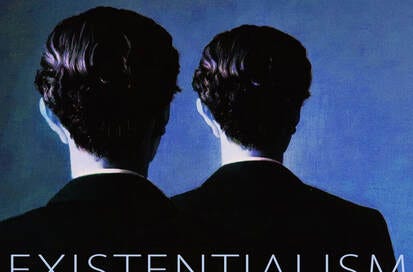…both Jung and Heidegger regard that process of differentiation as essential to human fulfilment – individuation for Jung, and authenticity for Heidegger – Roger Brooke
Have you ever wondered why you can’t find what you’re looking for in life? Have you ever been dismayed that after a long search you’re still not there? Why is knowledge so damn elusive? Why is mastery so difficult? Why despair, loss, futility, failure, ageing and death? Why one short life and so much to learn and gain?
The philosophy of Existentialism supposedly addresses questions of this sort. It’s said to be preoccupied with themes of loneliness, alienation, disenchantment, crises and breakdown. Why is the Age of Affluence also the Age of Anxiety? Why so many suicides among the privileged and smart? What’s wrong with society? Is civilization a good idea or is it terminal? What is a person’s responsibility toward themselves? Are the terms “individual,” “independence” and “uniqueness” ultimately meaningless? Am I wrong to go along to get along?
Actually, Existentialism is far more concerned with the way we do what we do, and whether we’re even aware of ourselves doing it. It’s not a popular mode of thinking for this very reason. The last thing most people want is to acknowledge themselves as Selves doing anything. Their “doing” is actually an aid to self-forgetfulness. The great Existentialists homed in on our many acts of self-deception, asking what it’s all about.
The question then arises whether you are mindful when you think and act, or merely concerned with finishing up, satisfying expectations and getting someone’s approval. Are you aware of your awareness and do you observe yourself being yourself? Are you really what you imagine yourself to be, and how could you start finding out? You may be kind and good, but are you “Authentic?”
What on earth is that?
Existentialism raises this odd question and provides profound answers as to what it means to be an authentic human being. It might be more than kindness, goodness, charity, sociability, skill and intelligence.
But again, we ask, what the devil is “authenticity?” What does it mean to live authentically, and how am I to know if I am doing so? Is the matter simply not worth bothering about?
The concepts of authenticity and inauthenticity are arguably the most complex and least understood notions in “Being and Time” – Havi Carel
We don’t normally encounter people that crazy about it. When is the last time you spoke to someone sincerely worried about whether their life had “meaning” or not? It’s not a stretch to say that without the philosophy of Existentialism, the world wouldn’t know or care about the subject. Even the rich and famous wouldn’t change their spendthrift lifestyles, and the lower classes wouldn’t stop trying to be like them.
With this in mind, Existentialists inquire into that which few notice or care about – a human being’s actual experience in the world. What do we really know about it? What answer do we get when we ask people to describe their existence? Can we do as much without getting stumped, puzzled and unintelligible? How do we experience the world? Have we ever been astonished that there is something rather than nothing? And what about the “self” doing the experiencing? What do we know about it in substantial terms?
Who says whether a self’s experiences have “meaning” or not? Who deigns to declare a Self authentic or inauthentic?
The answer is that authenticity is not a matter commented on by others. It’s not a matter of public opinion. It’s not necessarily on display. It’s actually one’s own business, which makes Existentialism very personalistic.
Heidegger's ethics of authenticity deals first and foremost with oneself, rather than with Dasein's responsibility to others – Havi Carel
Oh yes, and the most important point and problem: If one knew what it meant to live “authentically,” would they gratefully choose it or instead run headlong in the other direction? Authenticity and uniqueness may be utterly repugnant to those happily embedded as non-selves within the status quo. What’s the reason?
It has been noted that we humans are strange, contradictory and often sorry creatures. Nevertheless, comment on ourselves is possible because we are, in an apparently non-conscious universe, self-reflexive thinking beings.
The term “human being” implies intelligent mechanism. Human is flesh, bone, hide and hair, fibre, marrow, blood, tissue and little grey cells. But the odd term “being” connotes what exactly? We are bound to stop and think about it. The word trips us up. It’s obscure and opaque. Maybe it’s similar to Homo Sapiens, the thinking, intelligent, willful species on the planet. So is it proclaimed by those meant to know about such things. Plato, Aristotle, and a good many other leading philosophers throughout history presumed it so, and it’s still the dominant view.





